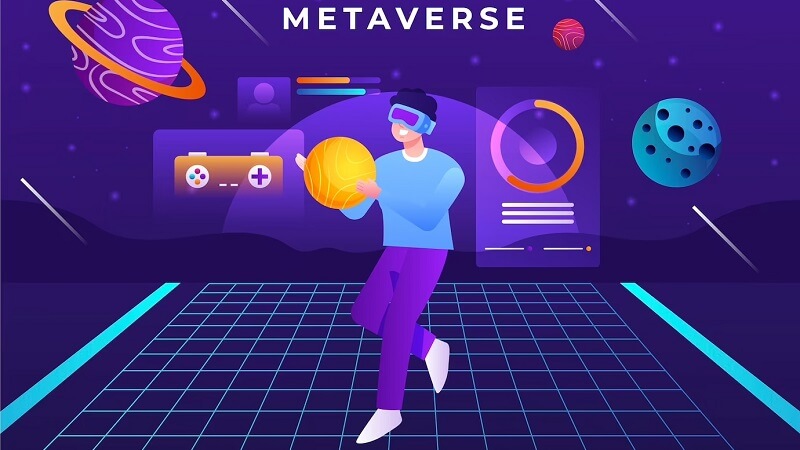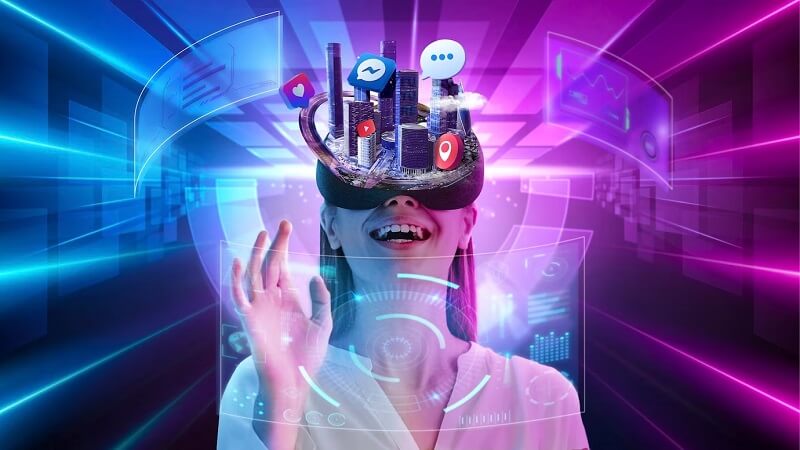Is the metaverse dead? Answering this question is not as simple as it seems, but we will try.
In recent years, the metaverse has been touted as the next frontier in digital technology, with experts predicting that it would revolutionize the way we interact online. But lately, the buzz surrounding the metaverse has quieted down, raising the question: “Is metaverse dead?”. In this article, we’ll delve into the current state of the metaverse, explore the reasons behind the perceived decline, and assess its future prospects.

The Rise of the Metaverse
The concept of the metaverse emerged from the realms of science fiction, where it was first envisioned as a shared, virtual space where users could interact with one another in real-time through avatars. This digital universe was imagined to be a seamless fusion of physical and virtual realities, blurring the lines between the two and providing a platform for limitless possibilities. As technologies like virtual reality (VR) and augmented reality (AR) advanced, this once-fantastical idea began to take shape, and the metaverse inched closer to becoming a reality.
Numerous companies, both large and small, recognized the potential of the metaverse and started investing heavily in its development. Now there are many metaverse companies and all of them are investing heavily in this technology. This wave of interest and investment served to accelerate the pace of technological advancements in VR, AR, and other related fields, further propelling the metaverse toward fruition. Giants like Facebook, Google, and Microsoft, as well as smaller startups, began exploring ways to create immersive virtual worlds that would enable users to experience new forms of entertainment, communication, and collaboration.
Transforming Industries: The Metaverse’s Far-Reaching Impact
The metaverse promised to transform not only gaming (there are currently many games based on the metaverse), which has been the most obvious beneficiary of VR and AR technologies, but also various other industries like real estate, education, and retail. In real estate, the metaverse could enable prospective buyers to tour virtual representations of properties without leaving their homes, while architects and designers could collaborate on projects in a shared virtual space. In education, the metaverse could revolutionize learning by offering immersive experiences that bring subjects to life and facilitate collaboration between students and teachers from different parts of the world. Lastly, in retail, the metaverse could open up new avenues for shopping, allowing consumers to interact with virtual products in a more engaging and realistic manner than traditional e-commerce platforms.
As the metaverse continues to evolve and mature, it holds the potential to reshape entire industries and redefine the way people interact with one another and the digital world. While there are still many hurdles to overcome in the pursuit of a fully realized metaverse, the progress made thus far and the growing interest from companies and consumers alike make it clear that the metaverse is not just a passing fad, but a significant technological advancement that will have a lasting impact on our society.

Is Metaverse Dead? The Current State
Despite the initial hype and the promise of a digital revolution, the metaverse technology has not yet materialized as the groundbreaking platform many had anticipated. This has led some to question whether the concept is losing steam, asking, “Is metaverse dead?”. While it’s true that the metaverse has faced a variety of challenges, it’s crucial to acknowledge that it is still in its early stages of development.
Developing a fully immersive, interconnected virtual world is an incredibly complex undertaking, requiring the integration of cutting-edge technology, the establishment of legal frameworks, and the navigation of social implications. Furthermore, it demands extensive collaboration and coordination between various stakeholders, including technology companies, regulators, and users. This level of complexity and the sheer magnitude of the task at hand mean that it will inevitably take time for the metaverse to fully materialize.
Overcoming Technical, Legal, and Social Barriers
One significant challenge is the need to create a seamless user experience, which requires advancements in areas such as VR and AR technology, high-speed internet connectivity, and computer processing power. Additionally, there are legal hurdles to overcome, including intellectual property rights, data privacy, and jurisdictional issues that arise from the borderless nature of the metaverse.
Moreover, the metaverse must also address the social obstacles it faces, such as fostering inclusivity, ensuring user safety, and promoting ethical behavior within the virtual environment. These social challenges are crucial to consider as they have the potential to shape the success or failure of the metaverse as a platform for communication, collaboration, and interaction.
While the metaverse may not have become the revolutionary platform many had hoped for, it is important to recognize that it is still in its infancy. The challenges it faces are not insurmountable but rather are a natural part of the development process for any groundbreaking technology. With continued investment, innovation, and collaboration, the metaverse has the potential to overcome these obstacles and ultimately become the transformative platform it was envisioned to be.

Reasons Behind the Perceived Decline
As the metaverse continues to evolve, it faces a number of challenges that have impacted its growth and widespread adoption. From technical limitations to fragmentation, privacy concerns, and monetization difficulties, these issues must be addressed in order to unlock the full potential of this transformative technology. In this section, we will delve into the major challenges currently facing the metaverse and explore their implications for the future of this virtual world.
- Technical limitations: Creating a seamless, immersive metaverse requires advanced VR and AR technologies, as well as stable internet connections and significant computing power. These limitations have hindered the metaverse’s widespread adoption.
- Fragmentation: The metaverse currently consists of several isolated platforms, which makes it difficult for users to have a cohesive experience across different virtual spaces.
- Privacy and security concerns: As with any online platform, the metaverse is vulnerable to hacking and data breaches, causing users to be cautious about sharing personal information.
- Monetization challenges: Companies investing in the metaverse are still figuring out how to enter the metaverse and make a profit, which has slowed the development process.
Is Metaverse Failing? Assessing the Challenges
While the metaverse has not yet lived up to its full potential, it is too soon to declare it a failure. The question “Is metaverse failing?” arises from unrealistic expectations and impatience for immediate results. Many groundbreaking technologies have experienced similar growing pains, and it’s important to remember that progress often occurs in stages.
- Overcoming technical limitations: As VR and AR technologies continue to advance, the metaverse will become more accessible to a broader audience.
- Building a unified metaverse: Industry leaders are increasingly collaborating to create interoperable platforms that allow users to move seamlessly between different virtual spaces.
- Addressing privacy and security concerns: Companies are working on implementing robust security measures to protect user data and privacy in the metaverse.
- Exploring new monetization strategies: Innovative business models are emerging to help companies generate revenue from their virtual spaces, such as virtual real estate and in-world advertising.

The Future of the Metaverse
Despite the challenges, the metaverse is far from dead. It remains an exciting frontier with immense potential for innovation and growth. As technology continues to evolve and more industries embrace the metaverse concept, we can expect to see new applications and use cases emerge.
Some potential developments in the metaverse include:
- Remote work: Companies could leverage the metaverse to create virtual offices, enabling employees to work remotely while still feeling connected to their colleagues.
- Education: The metaverse could transform education by offering immersive learning experiences and virtual classrooms, making knowledge more accessible to students worldwide.
- Entertainment: From virtual concerts to immersive gaming experiences, the metaverse will continue to revolutionize the entertainment industry, offering new ways for artists and creators to engage with their audiences.
- Social connections: As the metaverse becomes more sophisticated, users will be able to form deeper connections with others, transcending geographical boundaries and fostering a sense of global community.
- E-commerce: Retailers can create virtual storefronts within the metaverse, allowing users to shop and interact with products in a more immersive and engaging way.
Final Thoughts: Is Metaverse Dead or Simply Evolving?
Although the metaverse has not yet reached its full potential, it is far from dead. The question “Is metaverse dead?” stems from a misunderstanding of the challenges and complexities involved in creating a fully immersive, interconnected virtual world. As with any emerging technology, the metaverse will undoubtedly face obstacles and setbacks along the way.
Similarly, the question “Is metaverse failing?” is premature, as the metaverse is still in its early stages of development. It’s essential to maintain realistic expectations and recognize that the road to success is rarely linear. With continued investment, technological advancements, and industry collaboration, the metaverse will continue to grow and evolve, ultimately becoming an integral part of our digital lives.
The metaverse is not dead, nor is it failing. It is merely experiencing the challenges and growing pains associated with any groundbreaking technology. As the metaverse continues to develop and mature, we can expect to see it transform various industries and reshape the way we interact, work, and play in the virtual world.